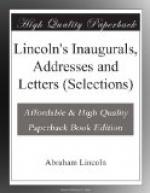The meeting is to be of all those who maintain unconditional devotion to the Union; and I am sure my old political friends will thank me for tendering, as I do, the nation’s gratitude to those and other noble men whom no partizan malice or partizan hope can make false to the nation’s life.
There are those who are dissatisfied with me. To such I would say: You desire peace, and you blame me that we do not have it. But how can we attain it? There are but three conceivable ways: First, to suppress the rebellion by force of arms. This I am trying to do. Are you for it? If you are, so far we are agreed. If you are not for it, a second way is to give up the Union. I am against this. Are you for it? If you are, you should say so plainly. If you are not for force, nor yet for dissolution, there only remains some imaginable compromise. I do not believe that any compromise embracing the maintenance of the Union is now possible. All I learn leads to a directly opposite belief. The strength of the rebellion is its military, its army. That army dominates all the country and all the people within its range. Any offer of terms made by any man or men within that range, in opposition to that army, is simply nothing for the present, because such man or men have no power whatever to enforce their side of a compromise, if one were made with them.
To illustrate: Suppose refugees from the South and peace men of the North get together in convention, and frame and proclaim a compromise embracing a restoration of the Union. In what way can that compromise be used to keep Lee’s army out of Pennsylvania? Meade’s army can keep Lee’s army out of Pennsylvania, and, I think, can ultimately drive it out of existence. But no paper compromise to which the controllers of Lee’s army are not agreed can at all affect that army. In an effort at such compromise we should waste time which the enemy would improve to our disadvantage; and that would be all. A compromise, to be effective, must be made either with those who control the rebel army, or with the people first liberated from the domination of that army by the success of our own army. Now, allow me to assure you that no word or intimation from that rebel army, or from any of the men controlling it, in relation to any peace compromise, has ever come to my knowledge or belief. All charges and insinuations to the contrary are deceptive and groundless. And I promise you that if any such proposition shall hereafter come, it shall not be rejected and kept a secret from you. I freely acknowledge myself the servant of the people, according to the bond of service,—the United States Constitution,—and that, as such, I am responsible to them.
But to be plain. You are dissatisfied with me about the negro. Quite likely there is a difference of opinion between you and myself upon that subject. I certainly wish that all men could be free, while I suppose you do not. Yet I have neither adopted nor proposed any measure which is not consistent with even your views, provided you are for the Union. I suggested compensated emancipation, to which you replied you wished not to be taxed to buy negroes. But I had not asked you to be taxed to buy negroes, except in such way as to save you from greater taxation to save the Union exclusively by other means.




